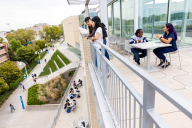You have /5 articles left.
Sign up for a free account or log in.

California Baptist University received $3 million to support Hispanic learners, adding supports for commuter and prenursing students.
California Baptist University
California Baptist University in Riverside, Calif., received $3 million in grant funding from the U.S. Department of Education to launch its first student success program for Hispanic learners.
The five-year grant will fund a support program, Preparados para el Exito (Prepared for Success), as well as targeted resources for commuter students and prenursing students, who are also majority Hispanic.
Grant at-a-Glance:
Where the Funds Will Go
- Hiring a program director
- Establishing a peer mentorship program
- Creating a summer bridge program for prenursing students
- Remodeling study spaces for commuter students
- A laptop kiosk for commuters
What’s the need: CBU is a Hispanic-serving institution (HSI) where 40 percent of the student population identified as Hispanic or Latino as of fall 2022. That number has skyrocketed over the past two decades, when the institution was 64 percent white and 15 percent Hispanic, explains Wayne Fletcher, associate provost for academic success.
“From my perspective, and as a faith-based institution, to see that happen means we’re representing the community and we’re pulling from our community, which is great,” Fletcher adds.
Riverside County is around 52 percent Hispanic or Latino, according to U.S. Census Bureau data.
“But in that process—that is, the demographic change—the dynamics change,” Fletcher says. “And we are really still playing catch-up a little bit in that. We do well with our students across the board, but we can do better. There’s still an achievement gap that’s happening that’s not acceptable.”
First-year retention rates across the university were around 73 percent for those who began their studies in fall 2021, with a four-year graduation rate of 43 percent and six-year graduation rate of 63 percent for students who began in fall 2016, according to data from the National Center for Education Statistics. For Hispanic students specifically, though, six-year graduation rates drop to 56 percent.
Up until now, the university has not offered specific academic supports for its Latino and Latina learners, Fletcher says. This grant is an investment in targeted measures to bridge completion gaps for Hispanic learners.
Putting it to work: Initially, Preparados para el Exito will focus on prenursing students and commuter students.
While a large number of Hispanic students enroll in prenursing programs, around 35 percent stop out in the first year. CBU will establish academic prep seminars for students who may struggle in mathematics, anatomy, physiology, biology or chemistry prior to the first term, equipping them for prenursing courses.
Around 70 percent of Hispanic students commute to campus. Focus groups revealed to campus officials that pressures at home often impede student success, primarily among women students, who can be expected to be caretakers for other family members, Fletcher says.
To support academic success, the university remodeled a study space on campus near other support offices such as the tutoring and writing centers. Here, commuter students can have a quiet space to work with reliable internet and a laptop on loan, if needed.
CBU will use some grant funds to purchase a laptop kiosk to house shared devices for students who may lack access to one.
The university is also focusing on commuter student programming that has more variety in offered days and times to accommodate students’ busy schedules and get them plugged in on campus.
“Really, the word is ‘connect,’ because when you have a relationship, it’s much more difficult to leave than when you don’t,” Fletcher says.
Peer mentorship will be embedded in the program, providing assistance for students on academic probation to improve their resilience with support from a classmate who has been through the same thing.
The goals: CBU leaders see the grant as supporting the university’s vision to spread a Christian worldview.
“We want our demographics to reflect where we are, and we want our graduates to stay in our community and bolster our community,” Fletcher says. “And so to the degree that we can continue to see more students graduate and stay in the Inland Empire and work with a Christian ethos … we want that to be reflected back into our community, as well.”
Grant funding was awarded Oct. 1, and the university is looking to hire a program director and two support staff in the near future, Fletcher says. Ideally, he adds, the director will be someone who knows the institution and who shares a Hispanic or Latino and first-generation college student background.
Seeking stories from campus leaders, faculty members and staff for our Student Success focus. Share here.
_-_04d10c.jpg)


